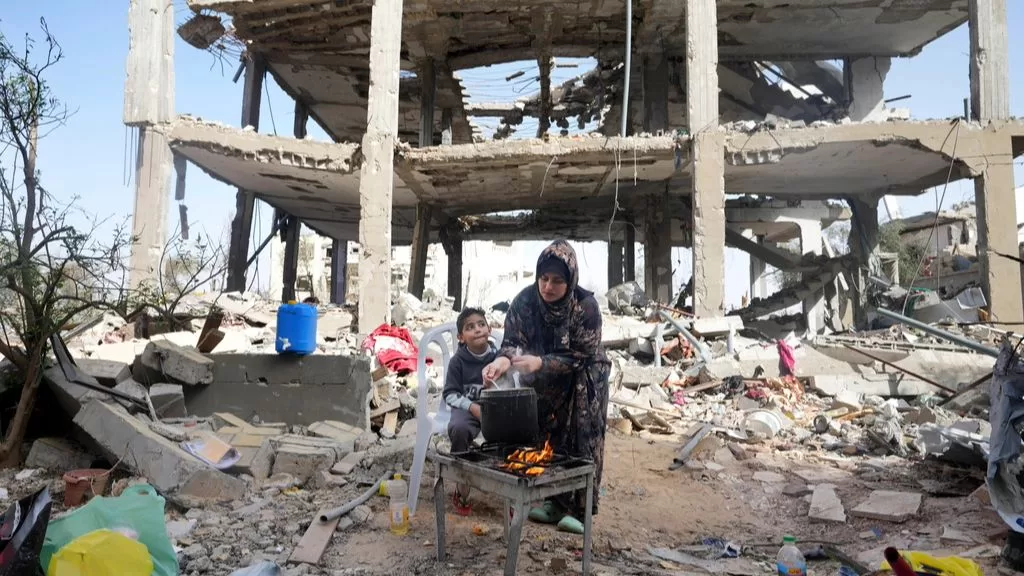Israel and Hamas agreed on Monday to extend their ceasefire for two more days, Qatar’s Foreign Ministry said, offering the possibility of a longer cessation to their deadliest and most destructive war and new exchanges of hostages held by militants for Palestinians imprisoned in Israel.
The announcement, made via social network A fourth hostage-for-prisoner exchange under that deal is expected later Monday. Qatar, along with the United States and Egypt, has been the key mediator in the ongoing war between Israel and Hamas.
Israel has said it will extend the ceasefire by one day for every 10 additional hostages released. Following Qatar’s announcement on Monday, Hamas confirmed it had agreed to a two-day extension “under the same terms.”
However, Israel also maintains that it remains committed to crushing Hamas’ military capabilities and ending its 16-year rule over the Gaza Strip. That will likely mean expanding its ground offensive from devastated northern Gaza to the south, where hundreds of thousands of Palestinians crowd United Nations shelters and harsh conditions persist despite increased aid deliveries during the truce.
Israel will resume operations with “full force” as soon as the current agreement expires if Hamas does not accept new hostage releases, with the goal of eliminating the group and freeing the rest of the captives, the government spokesman told reporters on Monday. , Eylon Levy.
So far, 58 hostages have been freed during the current truce, including 39 Israelis. Before the truce, four hostages were freed, another rescued and two were found dead inside Gaza.
After weeks of national trauma over the around 240 people abducted by Hamas and other militants, scenes of women and children being reunited with their families have united Israelis in support of calls to return those held captive.
“We can bring all the hostages back home. We have to keep pushing,” two relatives of Abigail Edan, a 4-year-old girl with dual Israeli and American citizenship who was freed Sunday, said in a statement.
Hamas and other militant groups could still hold up to 175 hostages, enough to potentially extend the ceasefire by two and a half weeks. But they include several soldiers, and the militants are likely to demand much more for their release.
The hostages’ families have led mass demonstrations and accuse Prime Minister Benjamin Netanyahu of not doing enough to bring them home. The growing pressure could force him to extend the truce and make additional concessions to Hamas. However, Israel also remains shocked by the October 7 attack and determined to eliminate the threat posed by the armed group.
“In the end we will return them all,” Netanyahu said of the hostages, clad in bulletproof vests on a rare visit Sunday to troops in the Gaza Strip. “We will continue until the end, until victory. Nothing will stop us.”
RELIEF IN THE GAZA STRIP
More than 13,300 Palestinians have died since the war began, about two-thirds of them women and children, according to the Health Ministry in Hamas-ruled Gaza. The figure does not differentiate between civilians and combatants. More than 1,200 people have been killed on the Israeli side, most of them civilians killed in the initial attack. Some 77 soldiers have died in the Israeli ground operation.
The pause in fighting brought some relief to the 2.3 million people in Gaza after weeks of constant Israeli bombardment that has driven three-quarters of the population from their homes and leveled entire neighborhoods.
But many said it was not nearly enough.
Amani Taha, a widow and mother of three who fled northern Gaza to stay with a host family in the southern city of Rafah, said she had only gotten one canned meal from a U.N. distribution center since the start of the cease fire. She helped other families in the neighborhood cook over bonfires in exchange for food for her children, who were between 4 and 10 years old.
Supermarkets and gas stations were overwhelmed by crowds trying to get basic supplies, he said. “People were desperate and went out to buy as soon as they could,” he said. “They are extremely worried that war will return.”
Palestinians still in northern Gaza, where more than a million people lived before the war, emerged to find scenes of widespread destruction as building after building was knocked down or badly damaged. The Israeli army has banned Palestinians who fled from returning.
The United Nations says the truce allowed it to increase the delivery of food, water and medicine to its largest volume since the war began. But the 160 to 200 trucks a day were still less than half of what Gaza imported before the fighting, even though humanitarian needs have skyrocketed.




